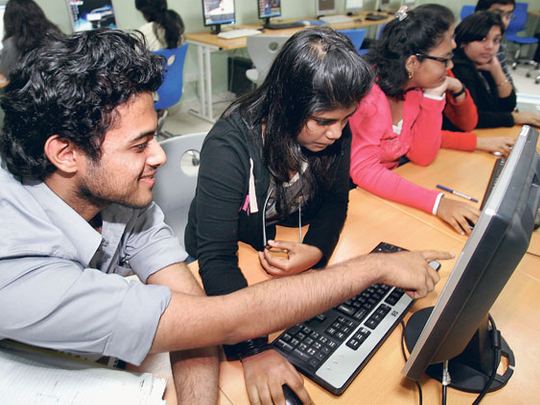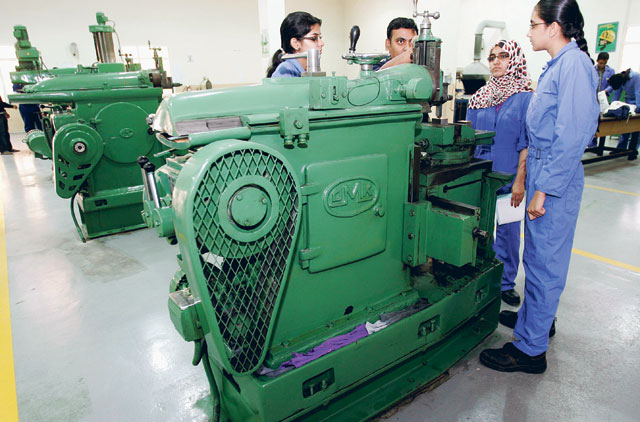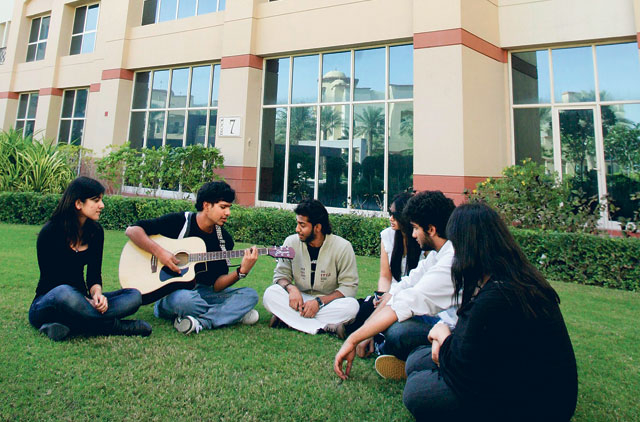
Dubai : Easier norms of entry and the promise of international exposure have turned the UAE-based campuses of premier Indian institutions for higher education into magnets for hundreds of affluent Indian students from within the region and the subcontinent where stiff competition prevents many from getting past choice schools.
According to the Consulate General of India, there are 19 offshore campuses of Indian institutions of higher education, with 4,500 Indian students studying in them in Dubai and the northern emirates. Of these, the big names in engineering and business management are a dream deal for students and for some parent organisations for whom the global campuses are proving to be veritable cash cows.
Until a few years ago, students from the Indian diaspora in the UAE and other GCC countries headed to India or to the West for higher education. But with the advent of branches of well-known Indian institutes in the UAE, it's not only Indian students from within the region, but also a sizeable chunk from the sub-continent itself who are converging on these campuses.
Worth the spend
The preference for the UAE branches stems from many factors, ranging from failure to get into good colleges back home, absence of entrance examinations, lower cut-off marks and award of degrees by the parent institutes, to other benefits like global setting, proximity to the motherland and a high level of safety. That the cost of education in the UAE is three to four times more than in India appears to be no deterrent as the brand equity that these institutes carry makes it worth the spend.
K. Mehta, a second-year computer science engineering student from Delhi at BITS Pilani Dubai, said she could not get through BITSAT, the entrance examination of the parent BITS Pilani Rajasthan. But she had little difficulty getting into the Dubai campus, she said, without elaborating on the marks that she obtained.
At BITS Pilani Rajasthan, 150,000 students vie for around 2,000 seats every year with stiff competition in the stringent entrance test nudging many with over 90 per cent marks out of the race. Similarly, it's only those in the top one or half per cent, out of the 250,000-plus students taking the competitive Common Admission Test (CAT), who make it into the top business schools.
In contrast, most of the UAE campuses do not hold entrance tests. BITS Pilani Dubai, for example, admits students who have an aggregate of 60 per cent marks overall and in core subjects in the Class XII qualifying examination.
Dr M. Ramachandran, Director of the institute, said the first preference for admission to its seven programmes in engineering is for resident students from the UAE and the GCC, with only the spill-over seats being open to students from India. Even so, 40 per cent of the 1,730 students on the campus specially come from India.
Similarly, at the S.P. Jain Centre of Management Dubai, which offers a one-year global MBA programme, 85 per cent of the 400 students have come from India, its dean Dr Michael Barnes said.
The college, which holds regular roadshows and student admission interviews in India, receives over 7,000 applications each year, many of them after the CAT scores are announced.
Rigid screening
Although CAT scores are not required for entry here, Dr Barnes said, "There is a rigid screening and students are required to have three years work experience."
While the S.P. Jain Centre is autonomous from the original S.P. Jain Institute of Management & Research in Mumbai — though it's guided by its principles — the UAE campuses of most other institutions are linked with the parent schools or varsities and follow the same curriculum and schedules.
Dr Praveen Dhyani, Director at the BIT Mesra Campus at Ras Al Khaimah (RAK), which is a branch of the BIT Mesra at Ranchi in India and is facilitated by the Royal College of Applied Science & Technology, said, "Teaching is done by BIT faculty in RAK, but the question papers comes from BIT Mesra. Answer sheets are sent back to BIT Mesra the same evening of the examination for evaluation."
The declaration of results and award of degrees is also done at Ranchi, he said.
The RAK campus, which has a cut-off mark requirement of 50 per cent for its courses in engineering and management, has 625 students, of whom 95 per cent are Indian, 10 per cent coming specially from India.
Cultural compatibility
For Indian students studying at the UAE campuses, the proximity and cultural compatibility of the UAE to India is deemed a big plus. "Parents are comfortable with the UAE," said Uma Prasad, Student Services Officer at the Manipal Academy of Higher Education (MAHE) Dubai, a branch of Manipal University in southern India, which offers diverse courses, including engineering. Of the 1,600 students on its campus, around 95 per cent are Indian, five per cent of whom come from India.
The sense of security that campus life offers in the UAE is also a favourable factor. While some of these institutes that are on leased premises put up students from abroad in accommodation outside the campus, others like BITS Pilani Dubai have on-campus hostel facilities.
Dr Priti Vajpayee, Dean of Student Welfare at the college, said its 15-acre campus at Academic City has a six-block residential hostel complex that accommodates 1,000 students, around 25 per cent of whom are girls.
At Pune University Ras Al Khaimah, Marketing Manager Wassim Hamadah said, "We do not provide hostel facilities, but we do give guidance for those seeking accommodation."
The campus set up last year to offer management courses has 40 students, 30 per cent of whom have come from India.
International exposure
While these colleges are predominantly Indian, the international exposure that they provide in a business hub like Dubai is a major draw.
At S.P. Jain, Dr Barnes said students have a double benefit as they get to do six months of their one-year course in Singapore, another premier business hub.
All of this, however, comes at three to four times the cost in India. A four-year course in engineering in the UAE costs a massive Dh120,000-Dh180,000 while a one or two-year MBA programme could range from Dh40,000 to Dh130,000. The cost is considered worthwhile.
In fact, many students who come here take educational loans to fund their courses. Prateek Jain, Student Council President who is doing his final-year electrical and electronics engineering at BITS Pilani Dubai, said, "My father is in the Indian Navy and I took an educational loan of Rs1.5 million (Dh119,321) to come here."
The colleges, on their part, justify the fees. "We cannot compare costs between India and Dubai. We provide the most economic per credit education in this part of the world," said Dr Ramachandran.
Large base
Dr B. Ramjee, Director of MAHE Dubai, said, "Our costs are based on the cost of living in Dubai and not the currency of another country. If we consider other universities here, we are neither too high nor too low." Even so, the steady stream of admissions has kept the cash registers ringing.
The New York Times recently reported that the outposts of some western universities in the UAE are struggling to attract students to survive. In contrast, the Indian colleges appear to be on a roll. "We have a large base," said the head of one institute, referring to the sourcing from India.
Review Under way
Is there a cap on the entry of more Indian colleges into Dubai?
"India is reviewing its higher education landscape. Until this is completed, no higher education branches can open outside India," Dr Warren Fox, Executive Director for Higher Education, Knowledge and Human Development Authority (KHDA), said.
He added that colleges from India, like the rest of the world, need branch approval from the UAE, which is the same for all Higher Education Providers (HEPs) and is part of the quality assurance process introduced by KHDA. HEP branch approval from KHDA's University Quality Assurance International Board is stipulated in a detailed manual, he said.
The issue of granting permission to more Indian institutes to open offshore campuses is being debated in India after the premier Indian Institute of Management (Bangalore) failed to get a go-ahead from the Human Resource Development Ministry to open a branch in Singapore in 2008. The Indian press reported that the ministry wanted IIMs to first cater to the demand at home given the huge demand-supply gap in IIM seats. There was also scepticism that the brand might get diluted overseas.














